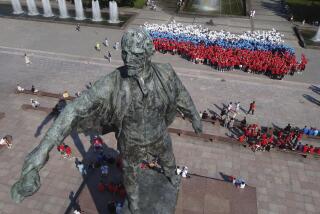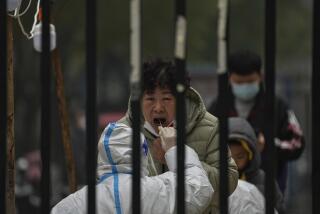Amid Gloom, 2 Cheers for <i> Perestroika</i> : Soviet Union: While the economy gets worse, democratic reform of the political system forges ahead remarkably.
- Share via
The Soviet Union today is a freer country than it has been at any period since the Bolshevik Revolution, yet it would be hard to think of a time in the past 70 years when there was more pessimism to be found in almost all social groups.
There is, indeed, much to be pessimistic about. Economic problems thus far are growing rather than diminishing, and inter-ethnic relations in many parts of the country are dangerously tense.
Short, however, of descent into greater chaos and disorder than have been seen up to now, it is far from obvious that conservative Communists are going to be the main beneficiaries of the present discontent. True, attempted secessions by one or more of the Baltic republics or major unrest in important Soviet cities could--at this difficult and delicate stage of perestroika --tip the balance in favor of counterre-formation.
But while it would obviously be foolish to downplay the gravity of the problems facing Mikhail Gorbachev’s leadership--or to deny that Gorbachev himself is significantly less popular in the Soviet Union in 1989 than he was in 1985--as the gap grows between raised expectations and stagnating or declining living standards, there are still some grounds for cheer.
All the signs are that the forthcoming republican and local elections--which will take place in some republics as early as December but in most next March--will be more fiercely competitive than those for the Soviet Parliament. A majority of republics have decided to dispense with a Congress of People’s Deputies and to have direct elections for their republican Supreme Soviets. They are also going to get rid of reserved seats for representatives of various “public organizations,” such as the Communist Party itself, and it looks as if virtually every seat will be a contested one.
The elections for soviets, or governing councils, at the republican, city, regional and district levels are likely to have two dramatic results. One will be an enormous surge of new blood into the Soviet Union’s body politic. The other will be the soviets’ first-time challenge to the power of the local party apparatus.
The first of these results is likely because incumbency has become as much a disadvantage to Soviet deputies as it is an advantage to American members of Congress. The deputies facing election in the coming months were “elected” under the unreformed system, which is stigma enough. In addition, they are being called to account for all the deficiencies of everyday Soviet life. It is probable that in massive numbers they will choose to duck the challenge. A survey in one Moscow district indicated that as many as 95% of present deputies did not intend to stand for the next election for the Moscow city soviet.
The people who are most at risk are local party officials. When many economic departments of the party were abolished last year, party secretaries feared that they might be deprived of some of their most important powers and functions. To assuage them, a decision was made at the 19th Party Conference that the first secretary at any particular level would become chairman of the local soviet.
That does, however, involve getting elected to the soviet in the first place. What was seen by Soviet radical critics at the time as an over-generous gift to the apparatus has turned out to be a poisoned chalice. It is one from which many party secretaries do not wish to drink. The idea that they must, as a firm rule, chair the soviet has been abandoned. But if they are defeated in the elections or do not stand, they will not, of course, be members of the local soviet at all, and that will be a significant departure from past practice in the Soviet Union. Up to the present the soviets at all levels have been poor relations to the dominant party organization.
Thus, the political reform of the Soviet system continues to move far ahead of the economic reform. While the former cannot be a substitute for the latter--or, more concretely, for an improvement in the standard of living--it is a remarkable achievement in itself. It is partly a consequence of Gorbachev’s “revolution from above” that has, however, been accompanied by rapidly growing pressure from below.
Prophecies of doom and gloom notwithstanding, the democratization and pluralization of the Soviet system look rather more likely to accelerate than to be put into reverse over the next six months. That, surely, is worth at least two cheers amid all the difficulties of perestroika.
More to Read
Sign up for Essential California
The most important California stories and recommendations in your inbox every morning.
You may occasionally receive promotional content from the Los Angeles Times.










